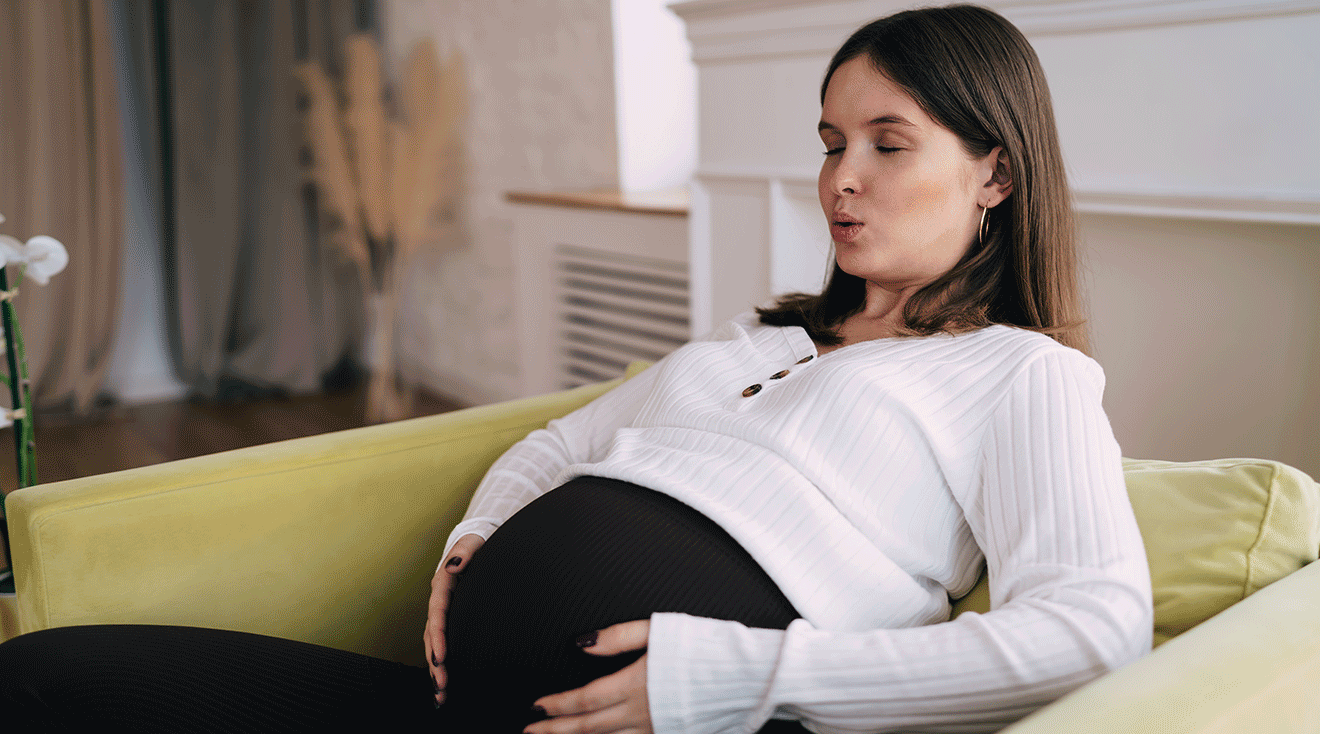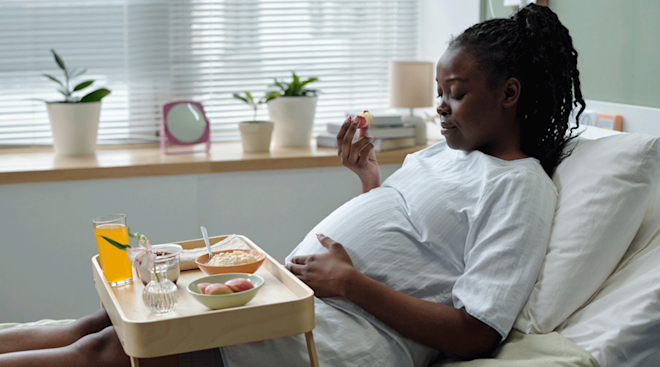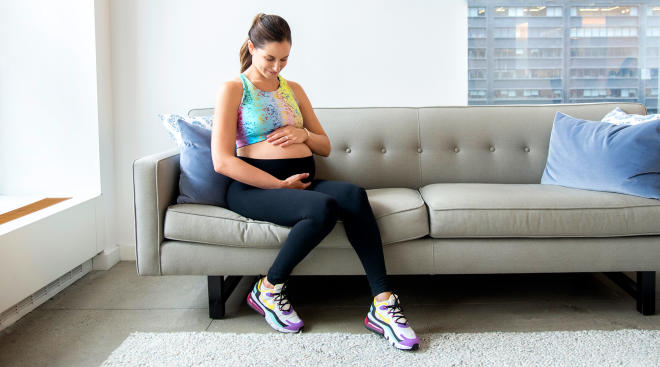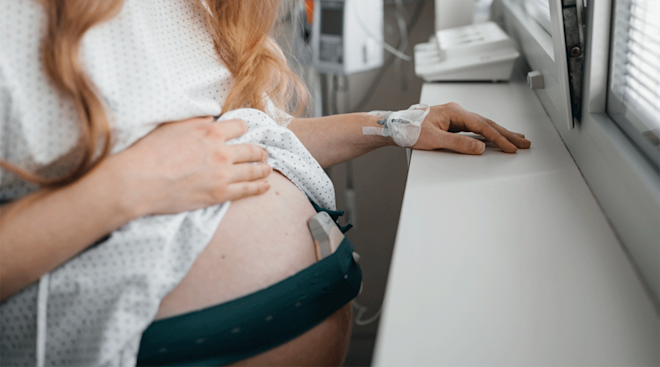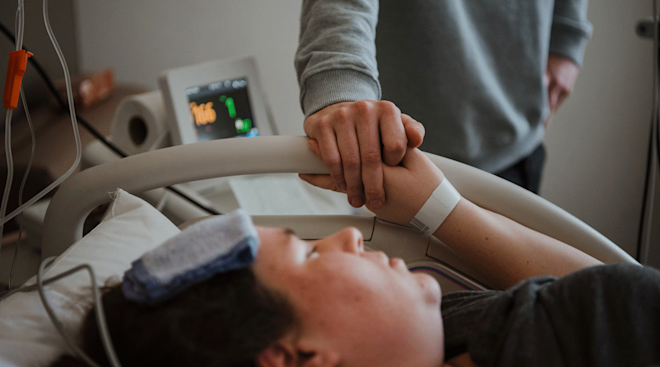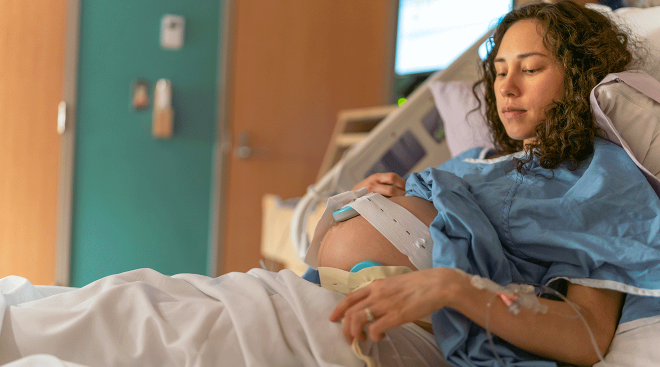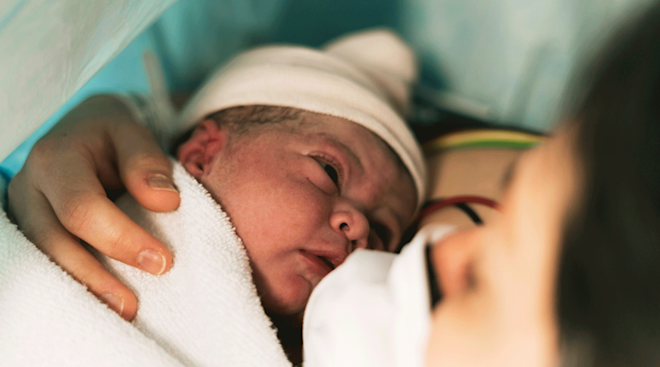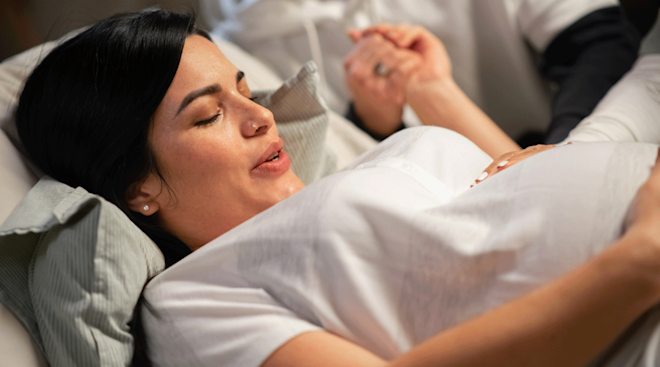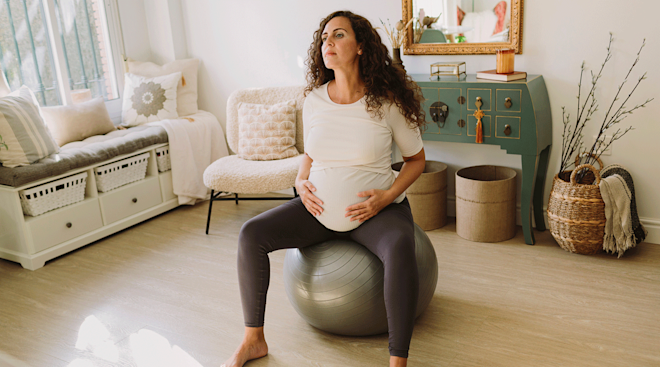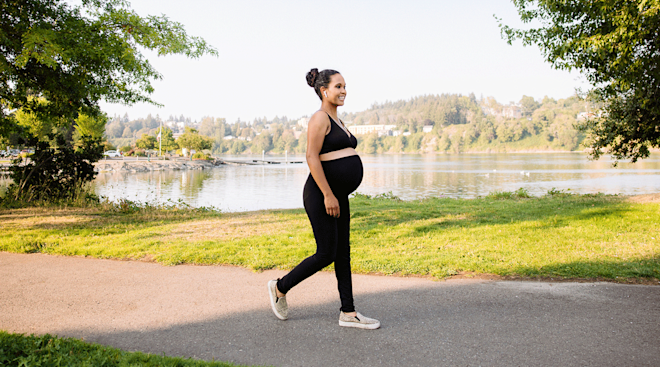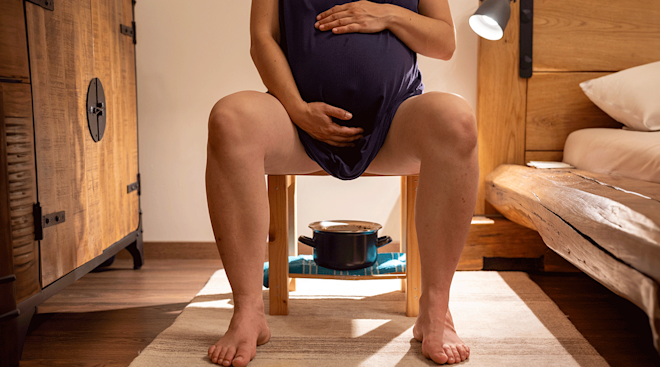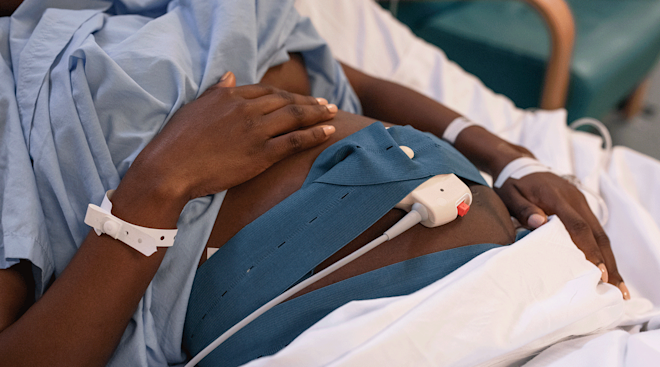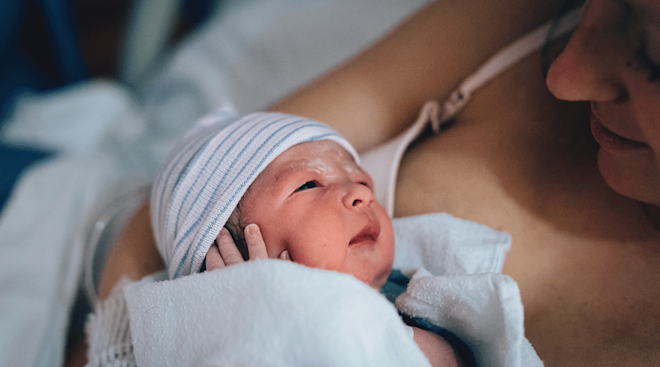Recognizing the Signs of Labor—Plus, What Happens During Latent Labor
You’ll know baby’s coming soon when you go into labor. But what exactly is labor? Essentially, it’s the start of childbirth—and you’ll know it’s happening when you start to feel contractions that become increasingly frequent and painful. But, unfortunately, labor might not start exactly on your due date—so how will you know when it’s time to grab your hospital bag and get to the delivery room? Needless to say, it can be unnerving trying to determine if it’s the main event or just a false alarm (hello again, Braxton Hicks). And while it’s not always crystal clear, the good news is that your body usually gives you some pretty solid clues. Ready to get a leg up on what early labor feels like and the early labor signs to look for? Read on to learn about the common signs of labor, and what you should do if you experience them.
Wondering what the early signs of labor are? First, it’s important to understand what happens during early or latent labor, which is the first part of the first stage of labor. During early labor, you’ll likely begin to dilate as much as 6 centimeters, says Christine Greves, MD, a board-certified ob-gyn at the Winnie Palmer Hospital for Women & Babies in Orlando, Florida (more on that below)—but this may not happen as obviously as you think.
In fact, while it may seem like early labor signs will be evident, many of the signs of labor that precede actual labor mirror typical pregnancy symptoms, which is why it can be so difficult to tell exactly when labor begins. Chances are, you’ll realize these subtle changes in your body only in hindsight. And some, like nesting, may be even easier to miss. (This common occurrence is when moms-to-be get a burst of energy to finish all the preparations for baby’s arrival, but it may occur a few weeks before labor actually starts.
While the signs of early labor may be easy to miss, knowing what to look for can help. Below, experts point out some signs that labor is near.
I had a scheduled elective C-section on Tuesday. The Friday before, I started experiencing light contractions… And then all of a sudden I had explosive liquid diarrhea. All in one fell swoop. I hadn’t expected for that to be my first sign of labor, but there it was! I was so worried that my C-section wouldn’t go as planned, but they were still able to perform one on me, just a couple of days early. And the digestive symptoms were a good way to clear my body beforehand—a little worrisome at first, but totally fine in the end.
Nausea and diarrhea
Remember morning sickness? It probably seems like ages ago at this point! But many women experience gastrointestinal upset late in the third trimester as well, and wonder, “Is diarrhea a sign of labor?” or maybe, “Is nausea a sign of labor?” Nausea and vomiting in the final weeks of pregnancy happen mostly because baby is growing and the uterus crowds into the space of the GI tract (stomach and intestines), says Colleen Moreno, DNP, CNM, director of midwifery services at Stanford Children’s Health, a network of practices and hospitals in the San Francisco Bay area. But they could also be early signs of labor. As the big event approaches, key hormones cause your muscles to relax and loosen—including those in your rectum. So, yes, diarrhea may be a telling clue.
Effacement and dilation
In the last few weeks of pregnancy, you’ll be visiting your doctor more frequently—and they’ll start checking your cervix for effacement (thinning) and dilation (opening). While it may be encouraging to hear that things are progressing, don’t get too excited yet. This process can be swift and sudden or slow and steady; it may happen over the course of hours, days or weeks. “Some women will be living their normal day-to-day life with a cervix dilated to four or five centimeters when they’re full-term,” says Julie Lamppa, APRN, CNM, a certified nurse midwife at Mayo Clinic.
Lightening
As you approach delivery day, a friend or loved one might look you up and down and inform you that “baby has dropped.” This is called lightening; it means that baby has settled lower into your pelvis in preparation for the big event. It typically occurs a few days (or weeks) before labor, according to the American Pregnancy Association. You may suddenly also have an easier time breathing, as there’s now less pressure on your diaphragm. Unfortunately, there’s increased pressure on your bladder. Don’t worry, the middle-of-the-night potty trips will come to an end soon enough.
Loosening of the joints
If your body is starting to feel a little looser and more relaxed, it’s not a coincidence. In fact, it may be one of the early signs of labor. Your body releases the joint-loosening hormone relaxin during the final stretch of pregnancy; it helps ready your body for the major feat ahead, but may also make you feel extra flexible—just be careful not to overstretch!
Lower back pain
Contractions can often begin in the back and move forward to the pelvis. And some women do experience “back labor,” which is characterized by severe discomfort in the lower back that’s most intense during contractions and often painful between contractions.
Expulsion of the mucus plug
Before baby can be delivered, your cervix has to thin out and open up, and as that happens, the mucus plug—a thick, mucus-like membrane that’s been blocking bacteria from entering your uterus—is pushed out. The mucus plug could be released all at once or little by little like a thick discharge. While this is one of the signs labor is near, it doesn’t necessarily mean you’ll be delivering your baby super soon. Labor could be hours, days or even weeks away as the cervix gradually opens.
For both of my pregnancies, the early signs of labor were exactly the same for me. It happened first thing in the morning after going to the bathroom…there was bloody show and that was my sign that it was 100 percent “go time, show time."
Blood-tinged discharge
When your mucus plug is expelled, some of the surrounding blood vessels may burst, leading to slightly bloody discharge. Sometimes called the “bloody show,” this discharge is one of the signs that labor is near, anywhere from minutes to up to two weeks away, says William Schweizer, MD, a former clinical associate professor in the department of obstetrics and gynecology at NYU Langone Medical Center in New York City. If you picture the size of a quarter, it’s normal to see about 50 cents worth of blood, he adds. If the bleeding is as heavy as your menstrual period, let your doctor know right away.
Regular cramping and contractions
A big one tip off that you’re in labor? Contractions that are coming regularly. “When the contractions start to increase in regularity and are becoming persistent, that’s probably the beginning of the latent phase,” Greves says. During this time, contractions may start about 15 minutes apart and last about 60 to 90 seconds, and then speed up to about five minutes apart.
But exactly what do early contractions feel like? By this point in your pregnancy, you’ve probably experienced just about every type of cramp possible. Well, except for this one very important (and painful!) type. Often, contractions during the latent phase of labor can feel like a strong tightening, squeezing or cramping in your back and lower belly, combined with (oh joy!) pressure in the pelvis. These can be super-painful or just a little uncomfortable, depending on your pain threshold, Greves says. If your early labor contractions aren’t bothering you, that’s a definite perk. Just know that they very likely will at some point. “In addition to frequency and regularity, the contractions should be progressively getting stronger or more uncomfortable,” Lamppa says.
According to Johns Hopkins Medicine, you can expect to feel these contractions every 5 to 20 minutes, and they may last between 60 and 90 seconds, Greves adds.
It’s a good idea to check in with your obstetrician or midwife’s office and let them know you’re experiencing early labor contractions, and give your doula the heads up, if you’re using one. They’ll likely tell you at what point to start heading to the hospital, but be warned: It might not be right away. That’s because many hospitals won’t admit you until you’re in active labor, so during the latent phase of labor, you’re probably better off at home.
You’ll want to make sure your bag is packed for the hospital and do what you can to stay comfortable. That may mean taking a bath or shower, and walking, bouncing on an exercise ball or swaying on your hands and knees, Lamppa says. For some good early labor positions, check out these expert-recommended options.
If you’re not too uncomfortable during early labor, don’t hesitate to use the time to get some sleep. “If you feel like your body needs rest, then rest,” Lamppa says. “Dozing or deep relaxation between contractions can help you recharge.” It’s also a good idea to stay well hydrated and eat light meals or healthy snacks during this time, she says.
Every woman is different, and it’s hard to say exactly how long your early labor will last. It can be anywhere from hours to days, Jessica Shepherd says.
“This depends on several factors, but one of the biggest influencers will be if you have labored or had a vaginal birth before,” Lamppa says. “If this is your first baby, early labor can last for even a day or two, or it can be a matter of hours. It’s very hard to predict. If you have had babies before, the intensity of contractions can progress very quickly, even during this early phase of labor.”
If those symptoms you’re experiencing really are early signs of labor, you can expect active labor next. This is the second part of the first stage of labor. Per Johns Hopkins Medicine, this is the stage during which dilate to a full 10 centimeters. Good news: it’s usually shorter than early labor. Wondering how you’ll know when active labor has begun? Here are some typical indicators that you’ve progressed from the early signs of labor to actual active labor.
Regular, painful contractions
It’s inevitable—your contractions will become more frequent, longer and more intense. “These contractions may be felt in the front, in the low back, down the thighs or all around—there are no concrete rules,” Lamppa says. They may occur as soon as every 3 to 4 minutes, Johns Hopkins Medicine notes. This indicates your body is beginning the process of birthing baby. The best thing to do? Relax as much as you can, get comfortable or perhaps take a shower. Time the contractions and head to the hospital or birthing center when they become about five minutes apart, if you haven’t already.
My water broke spontaneously before I actually was in active labor. I didn’t even think I was in early labor yet, to be honest. We were in bed planning out our lazy weekend, when I felt a suspicious trickle. I got up and went to the bathroom, and the floodgates opened. It was like a scene out of a movie. By the time we got to the hospital, my rubber Crocs were filled with amniotic fluid. Suffice it to say, this wasn't the tipoff I was expecting.
Rupturing of the amniotic sac (aka water breaking)
Despite what movies will have us believe, how your water breaks (in other words, how the membranes of the amniotic sac burst) can vary a lot, Schweizer says: It could be a minimal trickle or more like a gushing sensation. It may even feel like you’re peeing—but if you squeeze your pelvic muscles and can’t control the leaking, it’s probably not urine. Keep in mind, though, not all women’s water will break—in fact, only about 10 percent experience a rupturing of the membranes. Plus, per Mayo Clinic, it’s also possible for your water to break before you’re in active labor. But if your water breaks and you’re experiencing contractions, this is one of the biggest signs of labor. If your water breaks at term, but contractions haven’t set in yet, your doctor may want you to wait a few hours before coming in. If the liquid is red, brown or green in color, or if you see more than a quarter of a cup of fluid, call your doctor.
Increased pelvic and rectal pressure
Pelvic pressure is a common sign during the later stages of labor. You may feel pressure in your rectum too. Moreno describes it as a feeling “similar to needing to have a bowel movement.” Get ready, because this means that baby’s really on the way!
Your doctor will give you instructions on what to do and when to call if you start experiencing signs of labor. But if you’re unsure or have any disconcerting symptoms, don’t hesitate to reach out right away. And if this isn’t your first baby, Lamppa says you’ll want to keep in mind that things might move faster this time around. Either way, experts say you’ll want to get in touch with your practitioner right away if you experience any or all of the following:
- Contractions that last for at least 30 seconds and are five minutes apart for about an hour
- Strong contractions you can’t talk or walk through
- Your water breaks—especially if it’s red, brown or green
- You’re bleeding (more than spotting)
What’s more, if you have reason to suspect you’re in preterm labor (before week 37), call your doctor right away.
Frequently Asked Questions
When will I go into labor?
Sorry to say, your due date is just an estimate, and there’s really no telling exactly when baby will arrive. Ninety percent of women go into labor between 37 and 42 weeks, according to Schweizer—but that’s quite a window of time. Plus, some women may deliver before 37 weeks (which would be considered a preterm birth), while others may go past 41 weeks and wind up getting induced.
What are false signs of labor vs real signs of labor?
As your due date nears, every funny feeling or fleeting cramp in your belly will have you wondering: Is this it? Are these the first signs of labor? False labor signs (aka Braxton Hicks) can sometimes be confused with real labor contractions, but they do have some distinct characteristics. This nonproductive “labor” usually consists of nonpainful, irregular contractions that don’t worsen over time, Moreno says. “The uterus is a growing and stretching muscle, therefore, it cramps as it adjusts to the growth.” You’ll know if you’re in true labor if the contractions are centered in your pelvic area, arrive regularly and are accompanied by changes in fetal activity. Don't spend too much time analyzing though: If you think you're in the early stages of labor, call your doctor. Identifying the early signs of labor can be confusing, so there’s no harm in checking in or erring on the side of caution!
Are there ways to induce labor naturally?
“Spontaneous labor generally happens via mechanisms we still don’t totally understand,” Perlman says. There are some anecdotal ways to induce labor naturally, such as sex, exercise, acupressure, acupuncture and certain foods (like dates). However, it’s always best to consult with your doctor before trying any of them.
Can I be in labor and not know it?
Experts say it’s rare for someone to not know they’re in labor. Because early labor can happen over the course of a few days, it’s possible to miss it or mistake it for something else at first, says Nicola Perlman, MD, an ob-gyn and clinical fellow at Stanford Medicine Children’s Health. “During this stage, the person might feel anything from mild, period-like cramping to significant, painful contractions. All perceptions are normal!” But once the more active phase of labor starts, it’ll be hard to miss the pain of those contractions unless you’ve opted for pain medication, she adds.
What are the stages of labor?
There are three stages of labor, according to Cleveland Clinic. The first stage includes the early or latent phase of labor and the active phase. The second stage of labor begins when you’re fully dilated; it involves pushing baby out. The third stage of labor is delivery of the placenta.
Your body will give you lots of physical cues in advance of baby’s debut. Still, validating these early signs of labor can be challenging—especially for first time moms. You may wonder: “Is this a true indication of labor?” The answer: Only time will tell. Try to stay calm, monitor your contractions and don’t be embarrassed to call your doctor—even if you’re not entirely confident it’s go time. Rest assured that baby is coming (sooner or later!). You’ve got this.
Christine Greves, MD, is an ob-gyn at the Winnie Palmer Hospital for Women & Babies in Orlando, Florida. She received her medical degree from the University Of South Florida College Of Medicine.
Julie Lamppa, APRN, is a certified nurse-midwife at the Mayo Clinic and author of Obstetricks. She has over a decade of experience as a labor and delivery nurse and midwife. She also serves a clinical instructor in the department of obstetrics and gynecology at the Mayo Clinic College of Medicine and Science. She earned her nursing degree and her master’s degree in nurse midwifery from the University of Minnesota.
Colleen Moreno, DNP, CNM, is the director of midwifery at Stanford Children’s Health, a network of practices and hospitals in the San Francisco Bay area. She earned her doctor of nursing practice degree at the University of Washington in Seattle.
Nicola Perlman, MD, is an ob-gyn and clinical fellow at Stanford Medicine Children’s Health. She earned her medical degree from Harvard Medical School and completed her residency at Brigham and Women’s Hospital/Mass General Hospital.
William Schweizer, MD, clinical associate professor in the department of obstetrics and gynecology at NYU Langone Medical Center in New York City. He earned his medical degree from SUNY Stony Brook.
Jessica Shepherd, MD, FACOG, is an ob-gyn and minimally invasive gynecologic surgeon at Baylor University Medical Center in Dallas, Texas. She is also the founder of Her Viewpoint, an online women’s health forum that focuses on addressing taboo topics in women’s health in a comfortable setting. She received her medical degree from Ross University School of Medicine in 2005.
Mayo Clinic, Signs of Labor: Know what to expect, December 2021
American Pregnancy Association, Signs of Labor
Johns Hopkins Medicine, Labor,
Mayo Clinic, Water breaking: Understand this sign of Labor, November 2021
Cleveland Clinic, Stages of Labor, April 2022
Learn how we ensure the accuracy of our content through our editorial and medical review process.
Navigate forward to interact with the calendar and select a date. Press the question mark key to get the keyboard shortcuts for changing dates.
































